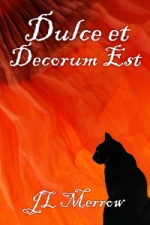Ah, mothers. Every hero has one—or does he? It’s a sad fact that for most of the time in which historical fiction is set, it wasn’t uncommon for mothers to say a final farewell to their sons rather sooner than we’d hope in today’s world of antibiotics and modern hygiene.
And as if childbearing itself weren’t perilous enough in less enlightened times, there’s the further danger of narrative demands—after all, where would Harry Potter have been, if his parents had lived? Not, one suspects, the star of seven ever-more-bricklike tomes. In fact the number of fictional orphans is so suspiciously high, one might be tempted to suspect some sort of juvenile murder ring going on.
But never fear. The fictional historical mother isn’t extinct, merely somewhat endangered. And often, due to the smaller circles in which people moved in former times, rather more closely involved in her son’s life than might be the case nowadays, both in happy times:
Mam came bustling down from upstairs, looking bright herself in her Sunday best. “Oh, that’s a beauty, Danny. Will you stay for supper with us now?” There was a furrow in her brow as she said it, so Danny reckoned he knew what the answer had better be. – Keeper’s Pledge
And also in times of worry:
“Mam, you know me and him have been, well, close?”
She nodded, tight-lipped. It wasn’t something they ever spoke of.
“I think it’s over, Mam. I can’t risk my job, not when like as not he’ll be looking for a reason to fire me. What’d we do then?” He tried to keep his voice steady, Lord knew, but the pain was too great not to let it show a little.
“Oh, Danny.” Mam put down her sewing and rose to lay a gentle hand on his arm, then gathered him to her. “Oh, love. Hush now. Don’t you worry. I’ll not say another word about it. You just do what you think is best.” – Keeper’s Pledge.
And maybe this close involvement, with children staying in the area their parents had grown up in, helped sons see a fuller picture of their mothers. Including the astonishing fact that mothers were once young themselves. Here’s Danny from Poacher’s Fall and Keeper’s Pledge talking to Philip about his mother:
“[Mam’s] always loved having a bit of mistletoe in the house come Christmas. Says it reminds her of how she met my da.”
“Oh? That was at Christmas? At a dance, I suppose?”
“There, sir, you’d be supposing wrong. See, she was the second chambermaid here, back when old Mr. Luccombe was alive, God rest him. Maybe you’d remember her? Right pretty she was, by all accounts. Helen Braithwaite, as was.”
Philip shook his head absently. He’d never really paid much attention to the chambermaids.
“Any road, she’d been sent to ask the men to cut some mistletoe for the hall, here. And it happened it was my da sent to get it for her. Now, Da being Da, he tells her she’s to come with him to get it. So he takes her out into the woodland, out to that very oak tree I came a cropper on. ’Course, I reckon it’s grown a bit since then,” he added, grinning.
It seemed to be infectious. “So I suppose he shinned up the tree and fetched the mistletoe, whereupon she was duly impressed and agreed to let him court her?”
Costessey’s grin had turned wicked. “Well, she never did go into detail, mind. But they were wed the following Easter, and I was born in time for harvest that year.” – Poacher’s Fall.
Which leads us on to another aspect of mothers. One of the perks of having grown-up (or nearly grown-up) children is, of course, being able to embarrass them and/or anyone they bring home to meet the parents. Here’s the reserved George meeting his friend Matthew’s mother for the first time in Dulce et Decorum Est:
Matthew’s mother was an unusually tall woman, thin as a beanpole and as energetic as a whippet. She greeted her son with a kiss that left him with powder on his shoulder and a faint lipstick mark on his cheek. She then proceeded to bestow the same honor upon George, rather to his discomfort. “Welcome to our home, dear. So glad that Matthew’s found such a good friend in London—a mother does worry so, particularly when—”
“Mother!” – Dulce et Decorum Est
***
JL Merrow is that rare beast, an English person who refuses to drink tea. She read Natural Sciences at Cambridge, where she learned many things, chief amongst which was that she never wanted to see the inside of a lab ever again. Her one regret is that she never mastered the ability of punting one-handed whilst holding a glass of champagne.
JL Merrow is a member of the UK GLBTQ Fiction Meet organising team.


